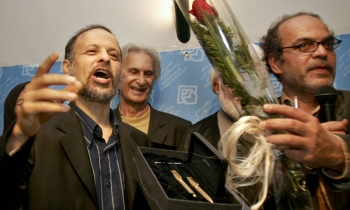An Alexandria court convicted a Egyptian blogger on Thursday for insulting both Islam and Egyptian President Hosni Mubarak and sentenced him to four years in jail over his writings on the Internet, according to Reuters.

Abdel Karim Nabil Suleiman, a 22-year-old former law student who has been in custody since November 2006, was the first blogger to stand trial in Egypt for his Internet writings. He was convicted in connection with eight articles he wrote since 2004 on his blog karam903. blogspot.com.
“This sentence is a disgrace,†said Reporters sans Frontières (RSF). “Almost three years ago to the day, President Mubarak promised to abolish prison sentences for press offences. Suleiman’s conviction and sentence is a message of intimidation to the rest of the Egyptian blogosphere, which had emerged in recent years as an effective bulwark against the regime’s authoritarian excesses.â€
The judge issued the verdict in a brief, five-minute session in a court in the Mediterranean city of Alexandria, the Associated Press (AP) reported. He sentenced Nabil to three years in prison for insulting Islam and inciting sedition and another year for insulting Mubarak. Nabil had faced a possible maximum sentence of up to nine years in prison. Nabil, wearing a grey T-shirt and sitting in the defendants pen, gave no reaction and his face remained still as the verdict was read. He was immediately taken from the pen and put in a prison truck and did not comment to reporters.
“This sentence sets a chilling precedent in a country where blogs have opened a window for free speech,†said Sarah Leah Whitson, Middle East director at Human Rights Watch. “The Egyptian government should abide by its commitments to uphold free expression and release Sulaiman without delay.â€
Amnesty International said in a statement: “This is yet another slap in the face of freedom of expression in Egypt.†The group considers Suleiman to be a prisoner of conscience, jailed solely for peacefully expressing his opinion, it added.
RSF said, “As a result of this conviction, which clearly confirms Egypt’s inclusion in our list of Internet enemies, we call on the United Nations to reject Egypt’s request to host the Internet Governance Forum in 2009. After letting Tunisia, another violator of online freedom, host the World Summit on the Information Society, such a choice would completely discredit the UN process for debating the future of the Internet.â€
“This heavy sentence is also a slap in the face for the international organisations and governments that support President Mubarak’s policies. It is time the international community took a stand on Egypt’s repeated violations of press freedom and the rights of Internet users,†the RSF statement said. Egypt is on the list of the 13 Internet enemies which RSF compiled in 2006.
Suleiman, who was arrested on November 6, 2006, got three years for inciting hatred of Islam and one year for insulting the president. The judge dismissed the charge of “spreading rumours liable to disturb the peace†which had been included in the prosecution’s indictment. Suleiman’s blogs regularly criticised the government’s religious and authoritarian excesses. He also criticised Egypt’s highest religious institutions including the Sunni university of Al-Azhar, where he studied law.
One of Suleiman’s articles said that al-Azhar in Cairo, one of the most prominent seats of Sunni Muslim learning, was promoting extreme ideas. Another, headlined “The Naked Truth of Islam as I Saw itâ€, accused Muslims of savagery during clashes between Muslims and Christians in Alexandria in 2005. He has also described some of the companions of the prophet Mohammed as “terroristsâ€, and has likened Mubarak to dictatorial pharaohs who ruled ancient Egypt.
On February 23, 2004, the newly-elected president of the Union of Egyptian Journalists, Galal Aref, made an important announcement: President Mubarak had just telephoned him and had formally undertaken to abolish prison sentences for journalists in connection with their work. In effect, he was promising a major overhaul of the laws concerning press offences. Three years later, nothing has changed. Journalists still risk being imprisoned despite the semblance of a reform last year, RSF said.









